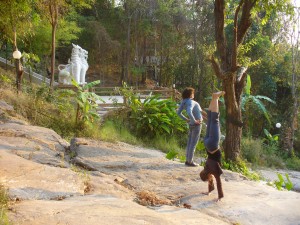The Sanskrit word kula means a community of the heart, or a group of people who have a shared intention. In some ways it is like a yoga family; we choose to get together and practice yoga. One of my favorite traditions of Anusara yoga is that we don’t only spend time with one another when a yoga event is happening, but we also get together just to hang out, to eat and socialize, and to play.

When we share experiences with others it can make our journey more interesting, the experience richer in some ways, and it can simply be more fun! Some of my fondest yoga memories and biggest insights both on and off of the mat came during the Anusara Immersion when I spent over 100 hours practicing, talking, meditating, and hanging out with 25 other yogis and yoginis. During this time, certified teacher Amy Ippoliti explained how being a part of the kula is like being connected to an intricate web; each of us supports the others and in return is supported. In this way we are all held in a giant universal embrace, and no one can be dropped.

The Tantric Yoga philosopher and teacher Douglas Brooks always says, “You are the company you keep, so keep good company!” Surrounding ourselves with like-minded people is one way to help us to grow as individuals. When we have difficult events or situations happening in our lives, we are connected to others who can help us to live in alignment with the intentions that we have previously set; friends who will keep us accountable. And when our lives are flowing and filled with sri (divine abundance) than we have people with whom to celebrate and share our joy.
Ways to encourage growth of a kula in your area:
- Set up a weekly or at least monthly practice session at a local studio or park, free or by donation if possible, and take turns leading the practice; practice in a circle or two lines facing each other and start by introducing yourselves
- Have a potluck and encourage local yogis and yoginis to come and bring their families
- Add partner work to your classes and encourage people to work with people who they do not already know
- After class, hang around and talk to people; find out what they are interested in and plan a group outing
- Invite teachers in from out of town to teach workshops and encourage local students to attend. Plan a gathering to follow the event and invite attendees and their families
- Host kirtan or devotional singing events in your studio
- Organize a study group who reads yogic texts or meets to discuss philosophy
- Join forces with other teachers and co-teach events; this will bring groups of students together who might not otherwise meet
- Network with other studios in your area and encourage an area-wide kula rather than one that is exclusive to your studio only
- Get the word out about events through a email list or Facebook group

